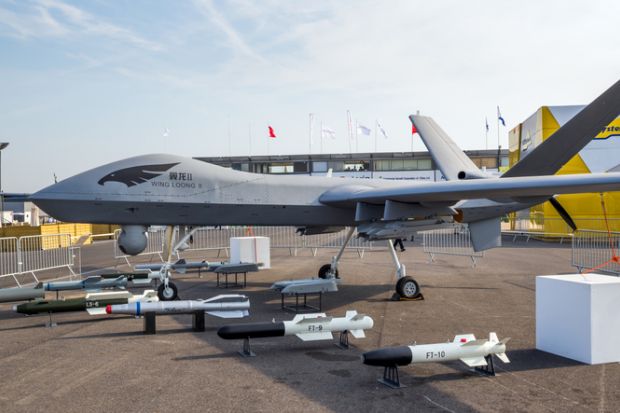Eighty-seven top civilian universities are among almost 160 Chinese institutions that a thinktank has deemed collaboration risks over their ties with military agencies.
The Australian Strategic Policy Institute (ASPI) says that an escalation of China’s “military–civil fusion” – the harnessing of civilian institutions to maximise military power – has intensified ties between the country’s best engineering universities and its defence establishment.
ASPI has combed Chinese-language files on university and government websites to compile a public database of the defence and security links of Chinese universities, research institutes and defence companies.
Governments should use the “China Defence Universities Tracker” to vet visa and funding applications, ASPI says, while universities should employ it as a tool “to avoid harmful collaborations”.
“Relationships with these entities could be leveraged for military or security purposes, including in ways that contribute to human rights abuses,” says a report accompanying the database.
The report says that much collaboration with China is “mutually beneficial” but some institutions have not managed the risks. It urges them to use the tracker in conjunction with recently published guidelines on countering foreign interference.
Report author Alex Joske said that the guidelines were a “helpful starting point” but not prescriptive, and it was unclear what governments would do if universities failed to adopt them.
Mr Joske, an analyst with ASPI’s International Cyber Policy Centre, said that the tracker could feed into universities’ management of their engagement with China. “The main purpose is to provide a tool for universities to better understand their partners in China, as much of the information about Chinese universities’ defence and security links is relatively inaccessible,” he said.
The tracker has grouped 92 Chinese institutions in a “very high risk” category. They include 52 People’s Liberation Army institutions, eight security or intelligence agency institutions, 12 defence industry conglomerates and 20 civilian universities.
The report highlights what it calls the “Seven Sons of National Defence” – leading universities with “deep roots in the military and defence industry” and expertise in armaments, aeronautics, astronautics and maritime and nuclear technology.
It says all seven are “subordinate” to the Ministry of Industry and Information Technology, which oversees China’s defence industry through the State Administration of Science, Technology and Industry for National Defence (SASTIND).
Another 23 civilian universities have been classified as high risk with a further 44 deemed medium or low risk. The report names 61 institutions that it says have become subordinate to SASTIND and its predecessor, COSTIND, through 101 “joint construction” agreements signed since 1999.
The tracker lists Chinese institutions with defence laboratories, security credentials and “designated defence research areas”, and those linked with state security agencies or “implicated in theft and espionage”.
It also lists 11 Australian and European universities that have major partnerships with China’s state-owned defence conglomerates. They include the University of Technology Sydney (UTS), which reviewed and terminated its joint research with the China Electronics Technology Group Corporation after media reports linked the partnership with human rights abuses in Xinjiang.
James Laurenceson, head of UTS’ Australia-China Relations Institute, told a conference in Suzhou that the research had been authorised by Australia’s defence department and the review had found that it involved fundamental research with no direct technological application.
He said that the human rights allegations had been about technology developed before the research in question had begun, and the relationship had ended because the “geopolitical environment had shifted”.
Register to continue
Why register?
- Registration is free and only takes a moment
- Once registered, you can read 3 articles a month
- Sign up for our newsletter
Subscribe
Or subscribe for unlimited access to:
- Unlimited access to news, views, insights & reviews
- Digital editions
- Digital access to THE’s university and college rankings analysis
Already registered or a current subscriber? Login








